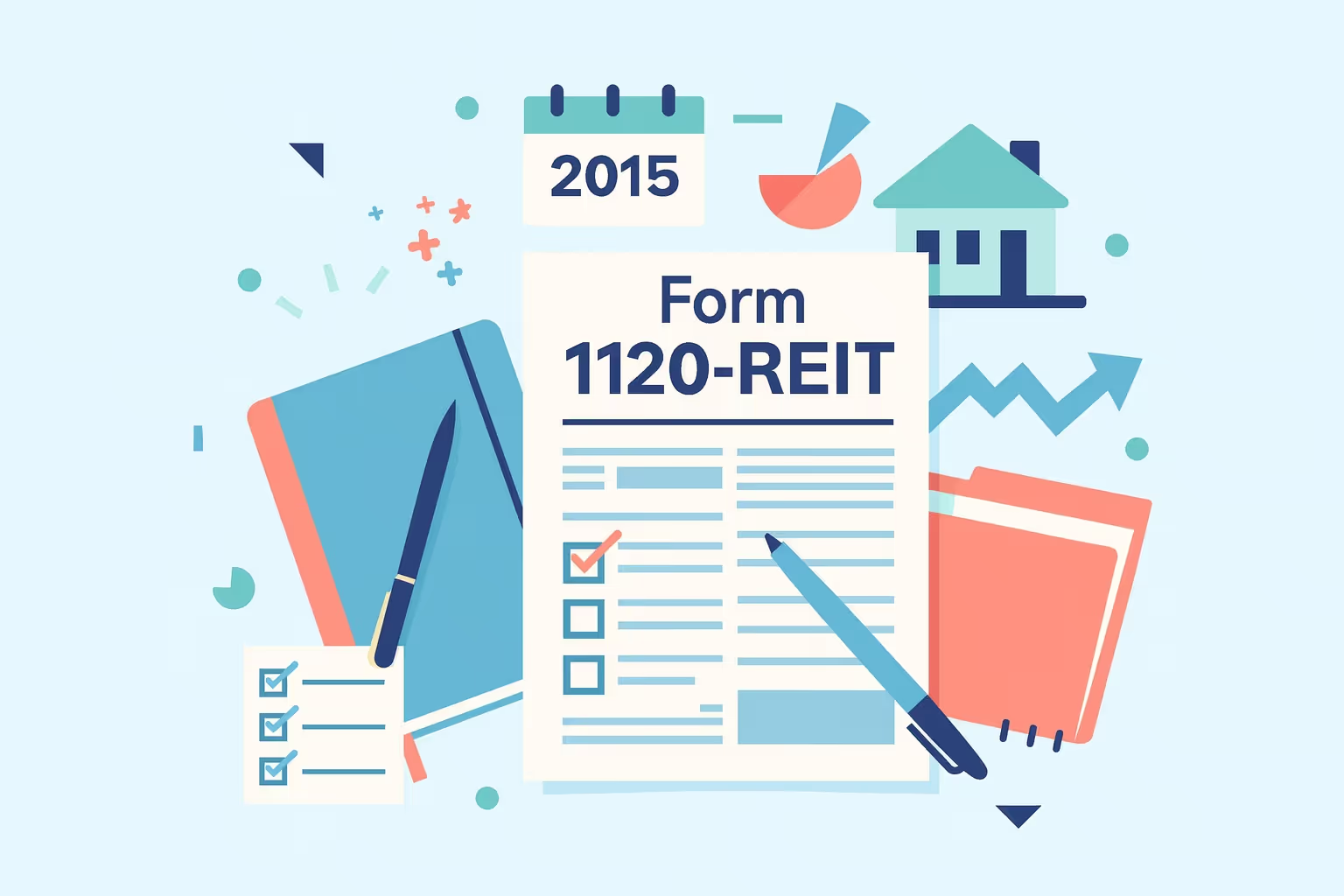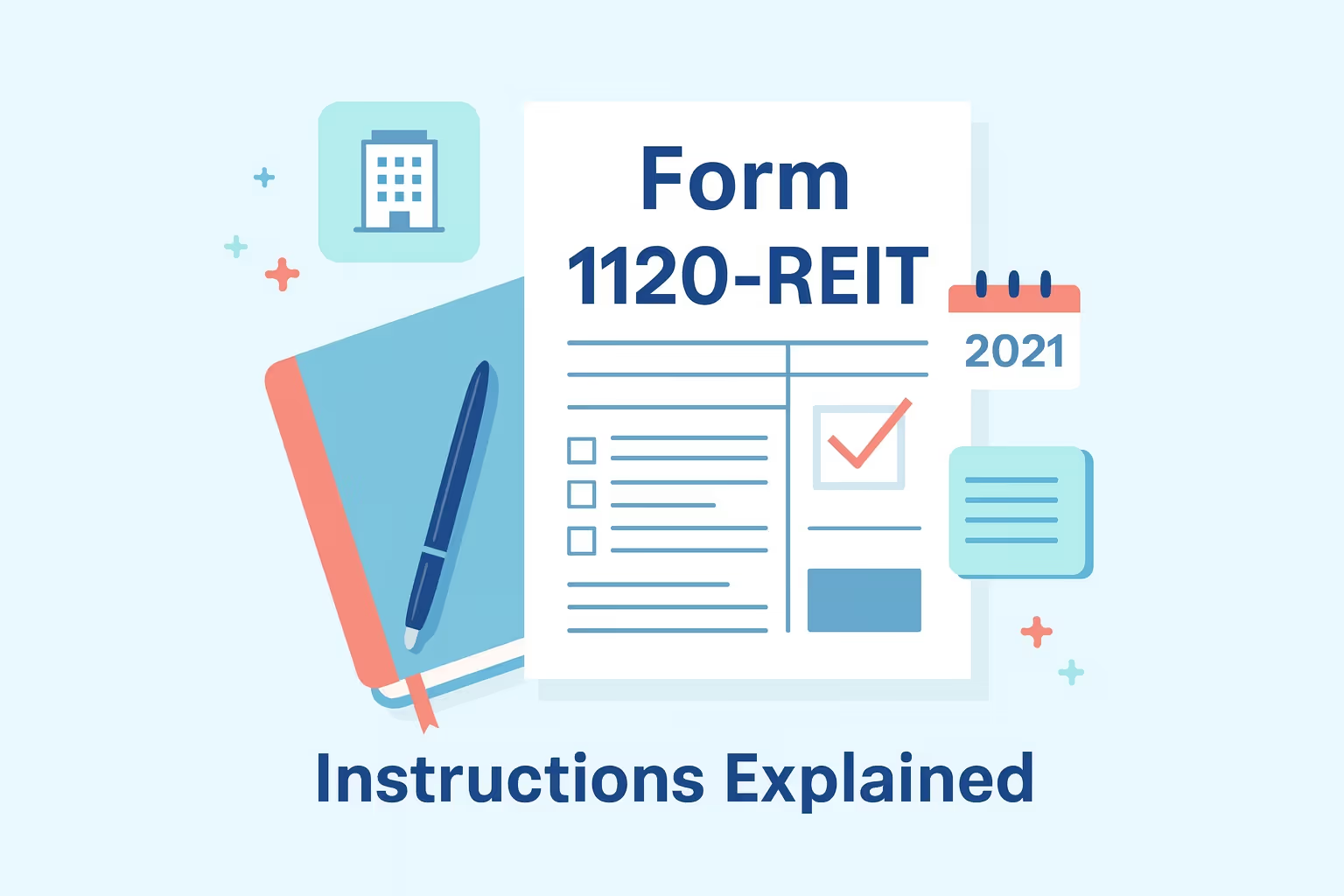
What IRS Form 1120-REIT (2018) Is For
Form 1120-REIT is the U.S. Income Tax Return for real estate investment trusts that elect to be treated as REITs under the Internal Revenue Code. A corporation, trust, association, or limited liability company treated as a corporation must file this tax return when maintaining REIT status and complying with ownership requirements, asset tests, income tests, and distribution requirements.
Resident corporations and certain pass-through entities that officially elected REIT status in a taxable year must meet strict rules involving transferable shares, total assets, average annual gross receipts, government securities, and real estate assets used to generate income earned from real property and business property. The Internal Revenue Service requires accurate reporting of taxable income, tax items, net income, capital gains, certain payments, and cash items for these entities.
For a detailed breakdown of filing requirements, eligibility rules, and step-by-step instructions, see our guide on Form 1120-REIT for 2018.
When You’d Use Form 1120-REIT for 2018 (Late or Amended Filing)
You would file IRS Form 1120-REIT (2018) if handling an unfiled return, a late submission, or an amended tax year correction. Many taxpayers file after receiving Internal Revenue Service notices indicating missing filings, balances due, or adjustments related to corporate income tax or corporate taxes from the preceding tax year.
The original deadline for tax years beginning in 2018 was April 15, 2019, or March 15, 2019, for REITs with a fiscal year. Refund claims expired April 15, 2022, based on the previous law governing statutes of limitation. Although refunds are no longer available, filing protects REIT status, clarifies corporate income, and resolves entity-level tax issues.
Key Rules Specific to 2018
- Flat-rate corporate tax structure: The Tax Cuts and Jobs Act established a flat-rate corporate tax, replacing prior brackets and changing how corporate income and taxable income are computed.
- Corporate Alternative Minimum Tax Repeal: The TCJA increased deductions by removing corporate alternative minimum tax requirements, effective for this taxable year.
- Interest limitation rules: New Section 163(j) rules limited interest deductions based on adjusted taxable income, requiring Form 8990 unless exceptions for small businesses or real estate applied.
- Section 965 transition tax: Certain foreign subsidiaries were subject to a transition tax on accumulated earnings, affecting federal revenue reporting.
- GILTI and related filings: New reporting rules for Global Intangible Low-Taxed Income (GILTI) have been applied, influencing income tax calculations for REITs with international operations.
Browse more tax form instructions and filing guides in our Forms Hub.
Step-by-Step (High Level)
- Confirm IRS transcripts: Request transcripts from IRS.gov to verify gross income, income earned, prior assessments, and tax items carried forward.
- Prepare the correct tax return: Complete Form 1120-REIT (2018) using the specific tax year version and instructions, accounting for net operating loss limits and full expensing rules.
- Attach required schedules: Include Schedule A, Schedule J, Schedule K, and any schedules relating to capital gains, specific improvements, real property, or business property.
- Submit the return: Mail the return to the appropriate Internal Revenue Service center or use e-file if available for tax years ending in 2018.
- Maintain documentation: Retain complete copies, depreciation schedules, real estate records, and ownership documentation for a minimum of three years.
Learn more about federal tax filing through our IRS Form Help Center.
Common Mistakes and How to Avoid Them
- Failing key income tests: Review income tests and confirm that at least 95 percent of gross income is from qualifying real estate and interest sources.
- Not meeting asset tests: Verify that real estate assets, government securities, and other holdings meet the required percentages of total assets.
- Incorrect dividends deduction: Calculate the dividends paid deduction accurately to meet distribution requirements and avoid losing REIT status.
- Misreporting real property transactions: Identify foreclosure property and specific improvements correctly to apply the correct tax benefits.
- Ignoring prohibited transactions: Review special rules to avoid anti-abuse tax exposure on sales treated as dealer activity.
- Mistiming late filings: Understand penalties involving taxes owed, payroll taxes, employee compensation reporting, and interest charges on late tax payments.
Learn more about how to avoid business tax problems in our guide on How to File and Avoid Penalties.
What Happens After You File
IRS processing typically takes six to eight weeks, although older or more complex tax years may require additional time. The Internal Revenue Service may issue notices requesting further information, documentation, or explanations regarding business activity, corporate income, or deductions.
If taxes are owed, penalties accrue from the original due date of the tax year. Payment arrangements can be made through Form 9465 or electronic methods. Taxpayers maintain appeal rights when disputing adjustments, including issues related to interest, base erosion rules, or improper classification of income.
FAQs
What penalties apply under IRS Form 1120-REIT (2018), and how do they affect corporate income tax?
Late filings may result in penalties based on unpaid taxes and the timing of the return. The Internal Revenue Service imposes monthly charges until full payment is made, including interest on unpaid corporate income tax amounts.
Does IRS Form 1120-REIT (2018) still interact with the corporate alternative minimum tax?
The corporate alternative minimum tax was repealed beginning in tax years starting in 2018, so REITs no longer compute liability under this system. However, prior-year adjustments may still require review.
How does IRS Form 1120-REIT (2018) impact corporate tax and corporate taxes for REITs?
Form 1120-REIT calculates federal corporate tax obligations at the entity level, including income, deductions, and distributions. It ensures REITs meet reporting duties separate from other corporate taxes.
Do employee compensation rules affect IRS Form 1120-REIT (2018) filings?
Employee compensation, payroll taxes, and certain payments must be reported accurately. Proper classification helps avoid penalties and ensures compliance with Internal Revenue Code provisions.
What anti-abuse tax considerations apply to IRS Form 1120-REIT (2018)?
Prohibited transactions can trigger an anti-abuse tax if activities resemble dealer operations. A careful review of property sales and intentions helps reduce exposure to potential risks.



































